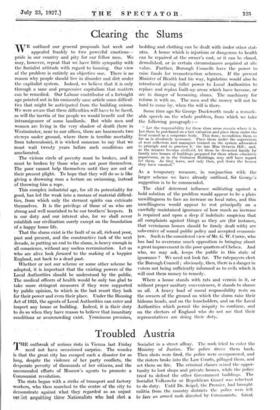Clearing the Slums
WE outlined pur general proposals last week and appealed frankly to two powerful emotions— pride in our country and pity for our fellow men. We may, however, repeat that we have little sympathy with the Socialist attitude with regard to housing. Our view of the problem is entirely an .objective one. There is no reason why people should live in disorder and dirt under .can be remedied. Our Labour contributor of a fortnight ago pointed out in his eminently sane article some difficul- ties that. might be anticipated from the building unions. We were aware that these difficulties will have to be faced, as will the inertia of the people we would benefit and the .intransigeance of some landlords. But while men and women are living in the very shadow of death (here in Westminster, near to our offices, there are basements two storeys under .ground, where there is terrible mortality from tuberculosis), it is wicked nonsense to Say that we must wait twenty, years before such conditions are ameliorated.
The vicious circle of poverty must be broken, and it must be broken by those who are not poor themselves. The poor cannot help themselves until they are out of their present plight. To hope that they will do so is like giving a drowning man a lecture on swimming, instead of throwing him a rope.
- This complex industrial age, 'for all its potentiality for good, has led the weak into a morass of material difficul- ties, from which only the sternest spirits can extricate themselves. It is the privilege of those of us who are strong and well nourished to be our brothers' keepers. It is our duty and our interest also, for we shall never establish our civilization surely except on the foundation of a happy home life.
- That the slums exist is-the fault of us all, rich and poor, past and present, and the constructive task of the next decade, in putting an end to the slums, is heavy enough in all conscience, without any useless recrimination. Let us who are alive look forward to the making of a happier England, not back to a dead past.
Whether or not our scheme or some other scheme be adopted, it is important that the existing powers of the Local Authorities should be understood by the public. The medical officers of health would be only too glad to take more stringent measures if they were supported by public opinion, to which in the last resort they look for their power and even their place. Under the Housing Act of 1925, the agents of Local Authorities can enter and inspect any house or building. Indeed, it is their duty to do so when they have reason to believe that insanitary conditions or overcrowding exist. Verminous premises, bedding and clothing can be dealt with tinder other stat- utes. A house which is injurious or dangerous to health can be repaired at the owner's cost, or it can be closed, demolished, or in certain circumstances acquired at site value. Further, Borough Councils have the power to raise funds for reconstruction schemes. If the present Minister of Health had his way, legislation would also be introduced giving fuller power to Local Authorities to replace and replan built-up areas which have become, or are in danger of becoming, slums. The machinery for reform is with us. The men and the money will not be hard to come by, when the will is there.
Some time ago Sir George Duckworth made a remark- able speech on the whole problem, from which we take the following paragraph :- " Let the responsibility for these slum areas remain where it is. Let them be purchased on a fair valuation and place them under the local council as a corporate body. This done, recondition them so far as is absolutely necessary. Place them under the supervision of rent collectors and managers trained on the system advocated in principle and in practice b • the late Miss Octavio Hill ; and, as the tenants become civilized, let them be decanted family by family into houses of buildings prepared for them where educative supervision, as in the Guinness Buildings, may still have regard for them. As they leave, and only then, pull down the houses they have vacated."
As a temporary measure, in conjunction with the larger scheme we have already outlined, Sir George's suggestion is to be commended.
The chief deterrent influence militating against a bold solution of the problem would appear to be a plain unwillingness to face an increase on local rates, and this unwillingness would appear to rest principally on a carefully maintained ignorance of how much an increase is required and upon a deep if indefinite suspicion that all complaints against things as they are (for instance, that verminous houses should be firmly dealt with) are subversive of sound public policy and accepted economic law. Such is the considered view of Mr. G. W. Currie, who has had to overcome much opposition in bringing about a great improvement in the poor quarters of Chelsea. And who, we may ask, keeps the public in this state of ignorance ? We need not look far. The ratepayers. elect the Borough Council ; obviously, then, there is a danger in voters not being sufficiently informed as to evils which it will cost them money to remedy.
Where a house stands with rats and vermin in it, or without proper sanitary conveniences, it stands to shame us all. A heavy load of moral responsibility rests on the owners of the ground on which the slums raise their hideous heads, and on the leaseholders, and on the Local Authorities which permit the iniquity to continue, and on the electors of England who do not see that their representatives are doing their duty.






















































 Previous page
Previous page